By Katie Eubanks
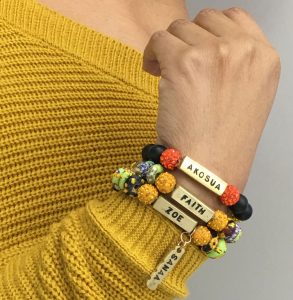
Vacation leads to global bracelet business
Last July, Shameka Reed flew to Ghana for a vacation. Six days later, she wound up with so much more than a souvenir.
Oh, she saw the sights — like the Independence Arch, commemorating Ghana’s independence from Britain; and historical Jamestown, the fishing village from which the capital city of Accra grew.
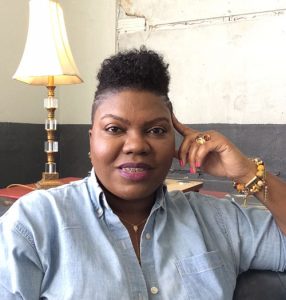 But what really got her attention was a woman selling bracelets in a marketplace.
But what really got her attention was a woman selling bracelets in a marketplace.
“There were hundreds of people there. (And) in that setting, it was very overwhelming because everyone was trying to sell you something. It was a very haggling kind of situation. But what I felt from her was a very calming spirit even in the midst of all that chaos,” Reed said.
The woman’s bracelets were high quality and, best of all, personalized.
“Wherever I go, I always want to bring something back that’s personalized,” Reed said.
She ordered some bracelets for friends and for herself, picked them up a couple days later and took a business card from the vendor.
“Her business cards that she gave me had a reference to a scripture on it. It was a family-owned business. I saw her interacting with her sisters and her brother. And I felt like she was fair as well. … She’s a believer. I knew just from my interactions with her. A tree is known by the fruit that it bears.”
Reed told her she’d keep in touch.
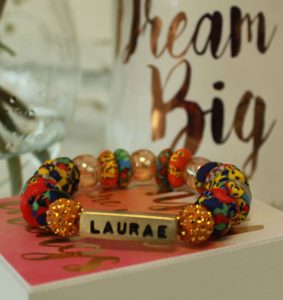 The next day, Reed started her multi-flight journey back to the States. She had a 10-hour layover in Morocco, complete with a hotel stay, and sent the bracelet maker a message in WhatsApp.
The next day, Reed started her multi-flight journey back to the States. She had a 10-hour layover in Morocco, complete with a hotel stay, and sent the bracelet maker a message in WhatsApp.
“And pretty much by the time I left Morocco, we had hashed out (a lot of) the details (for me to retail her bracelets).”
Reed ordered sample bracelets, built a website, posted photos and in September started doing business. She chose the name “Twi” because it’s the official language of Ghana.
Each bracelet is custom made in Ghana and shipped to Reed, who then ships it to the customer. Twi sells bracelets bearing the words “faith,” “hope” or “love”; personalized bracelets with the customer’s name; and “daily” bracelets, based on a West African naming tradition:
“What happens with the daily bracelets is you Google your birthday. I googled Oct. 31, 1980. That showed me I was born on a Friday. Whatever day you were born on would typically (determine) your first name (in Ghana). So my first name would’ve been Afia,” Reed said.
The daily bracelets are available with all seven female “day names” used in Ghana.
And, Twi has Kwanzaa bracelets for sale at the Two Mississippi Museums gift shop in Jackson.
At press time, Twi sold only bracelets, but Reed was planning to launch a line of personalized, handmade charm necklaces from another vendor. “I want to stay in the personalized business,” she said.
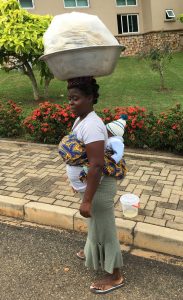
A Ghanaian woman selling corn carries her product on her head, along with a baby on her back. (Photo courtesy of Shameka Reed)
Reed refers to herself as a “serial entrepreneur.” She’s run seven businesses to date, including Twi. She also works full time at Jackson State University as an international marketing and recruitment specialist and study abroad coordinator.
For Reed and the artisan who makes the bracelets, Twi is a win-win: Reed keeps no inventory in the States and only orders what she needs for specific customers. The sales benefit both her and her vendor — but because of the low cost of living in Ghana, the profits make an even bigger difference there.
Also, “we like to consider ourselves a socially conscious company. A portion of our monthly sales is donated to nonprofits, organizations and individuals in support of various educational, humanitarian and philanthropic efforts,” Reed said.
Reed and her vendor talk every week about products and orders, and Reed wants to go back to Ghana — hopefully this year.
“I never looked at myself as having a global business, but when you’re waking up at 3 in the morning to fix problems (because of the time difference), you kind of have a global business. So it’s important for me to cultivate that relationship (with the vendor).”
She also never saw herself as a retailer.
“I did kind of second-guess myself (about starting Twi),” she said. “But I saw a market for it. I had not seen anything like it in the United States. … I saw it as a great opportunity.”
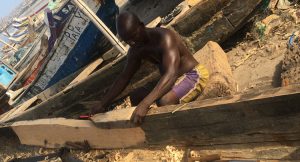
A man in Jamestown, the oldest district of Ghana’s capital city of Accra, builds a boat. Jamestown is known for its fishing economy. (Photo courtesy of Shameka Reed)